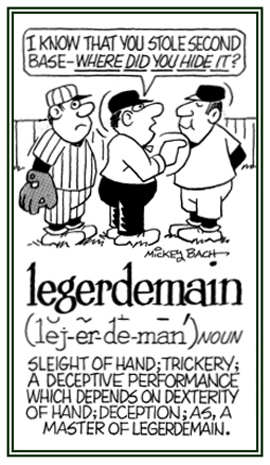lev-, levi-
(Latin: light in weight, lightness; to raise, to rise, to lift)
1. An agent, often yeast, that causes batter or dough to rise; especially, by fermentation: The baker used leaven to make the bread dough expand.
2. An element, influence, or agent that works subtly to lighten, to enliven, or to modify a whole: The speaker included a leaven of humor in order to brighten the mood of the audience.
2. An element, influence, or agent that works subtly to lighten, to enliven, or to modify a whole: The speaker included a leaven of humor in order to brighten the mood of the audience.
1. A display of skill or cleverness; especially, for deceitful purposes; trickery; deception: Sharon performed a dazzling show of political legerdemain to be elected as a senator of her state.
2. A sleight of hand; magic tricks; any illusory feat: Hank's skill in legerdemain was amazing; however, he lacked the showmanship necessary to become a professional magician.
3. Any kind of skill by which something happens without it being obvious as to how it is done: There apparently are some economists who use legerdemain to increase profits with their investments.
4. Etymology: from about 1430, "conjuring tricks", from Middle French (as written and spoken approximately between 1400-1600) léger de main, "quick of hand" from léger, "light" in weight. Previously from Latin levis, "light" + Latin main or manus), "hand".

© ALL rights are reserved.

© ALL rights are reserved.

© ALL rights are reserved.
Go to this Word A Day Revisited Index
2. A sleight of hand; magic tricks; any illusory feat: Hank's skill in legerdemain was amazing; however, he lacked the showmanship necessary to become a professional magician.
3. Any kind of skill by which something happens without it being obvious as to how it is done: There apparently are some economists who use legerdemain to increase profits with their investments.
4. Etymology: from about 1430, "conjuring tricks", from Middle French (as written and spoken approximately between 1400-1600) léger de main, "quick of hand" from léger, "light" in weight. Previously from Latin levis, "light" + Latin main or manus), "hand".



Go to this Word A Day Revisited Index
so you can see more of Mickey Bach's cartoons.
Someone who is a trickster or practices sleight of hand: While visiting in foreign countries during their trip, Jim and his wife were warned that there could be a legerdemainist who might attempt to deceive them into providing so called currency exchanges which could result in their money being stolen.
Levator labii superioris et nasi. (Latin term)
Translation: "Lifter of the upper lip and the nose."
A medical term for the muscle in the upper lip.
1. An embankment raised to prevent a river from overflowing: Regardless of the engineering efforts, the old levees were insufficient to hold back the floods from the heavy rain.
2. A small ridge or raised area bordering an irrigated field: The farmer maintained a levee around his agricultural land.
3. A natural embankment alongside a river, formed by sediment during times of flooding: The children enjoyed looking for and finding interesting little plants and animals in the levees which were created after the deluge during the previous month.
4. A landing place next to a river; a pier: Albert and Janice pulled up their little rowboat to the levee so they could get out have their picnic.
2. A small ridge or raised area bordering an irrigated field: The farmer maintained a levee around his agricultural land.
3. A natural embankment alongside a river, formed by sediment during times of flooding: The children enjoyed looking for and finding interesting little plants and animals in the levees which were created after the deluge during the previous month.
4. A landing place next to a river; a pier: Albert and Janice pulled up their little rowboat to the levee so they could get out have their picnic.
1. A strong bar that is used to lift and to move something heavy: Jack had to use a lever in order to lift up the crate containing bricks.
2. A rod which is used to operate or to adjust something on a machine, a vehicle, a device, etc.: Jim was told to pull the brake lever in order to stop the loading of gravel into the truck.
2. A rod which is used to operate or to adjust something on a machine, a vehicle, a device, etc.: Jim was told to pull the brake lever in order to stop the loading of gravel into the truck.
lever (verb), levers; levered; levering
1. To lift or to move something: The highway contractors were levering the big rocks out of the area where the new road would go.
2. To move or to force something; especially, in an effort to get something open: Mark levered an opening into the top of the steel barrel.
2. To move or to force something; especially, in an effort to get something open: Mark levered an opening into the top of the steel barrel.
1. The influence or power used to achieve a desired result: The baseball player's skills gave him more leverage with the owners of the team.
2. An increase in force which is gained by using a strong metal tool: By using the right leverage, Jack was able to pry the large rock out of the ditch.
2. An increase in force which is gained by using a strong metal tool: By using the right leverage, Jack was able to pry the large rock out of the ditch.
leverage (verb), leverages; leveraged; leveraging
1. To use something of value to achieve a desired result: The manufacturer of various hand tools tried to leverage his company's sales in other countries.
2. To apply a force to an object when something; such as, a metal bar is used: Max was leveraging more weight to pry the rock out of the hole.
2. To apply a force to an object when something; such as, a metal bar is used: Max was leveraging more weight to pry the rock out of the hole.
Primarily a U.S. term, referring to a business arrangement in which someone buys a commercial organization by borrowing money based on the value of the company which is being purchased: One enterprise was trying to arrange for a leveraged buyout of a competing corporation.
1. A smooth, fine powder or paste which was ground up when moist: The worker produced the levigates of a mineral into fine granules with a mixer.
2. Very small particles that have come from coarse ones by grinding them in water: Jim obtained the pulverized granules from the rougher ones by suspending the levigates in a liquid.
3. Something that is flat so it can be polished: The workers had a liquid mixture which was a smooth, uniform liquid composition; such as, a paste or a gel that was a levigate which could be utilized to make the top of the table smooth and shiny.
2. Very small particles that have come from coarse ones by grinding them in water: Jim obtained the pulverized granules from the rougher ones by suspending the levigates in a liquid.
3. Something that is flat so it can be polished: The workers had a liquid mixture which was a smooth, uniform liquid composition; such as, a paste or a gel that was a levigate which could be utilized to make the top of the table smooth and shiny.
levigate (LEV i gayt") (verb), levigates; levigated; levigating
1. To rub or to reduce to fine particles as when pulverizing something with or without the addition of a liquid: A smooth paste can be obtained by first levigating zinc oxide with a small amount of glycerin.
2. To separate fine powder from coarser material by suspending it in a liquid: Jacob was levigating sand and gravel so he could put the smaller particles around his cacti plants. 3. Etymology: from Latin levigare, "to make smooth, to pulverize"; from levis, "smooth" + agere "to make, to drive, to lead, to do" a : to grind to a fine smooth powder while in moist condition b : to separate (fine powder) from coarser material by suspending in a liquid
2. To separate fine powder from coarser material by suspending it in a liquid: Jacob was levigating sand and gravel so he could put the smaller particles around his cacti plants. 3. Etymology: from Latin levigare, "to make smooth, to pulverize"; from levis, "smooth" + agere "to make, to drive, to lead, to do" a : to grind to a fine smooth powder while in moist condition b : to separate (fine powder) from coarser material by suspending in a liquid
A process in which a solid has been rubbed into a fine powder: The construction company had levigations of stones which were used with cement to make concrete which is a strong building material composed of sand, gravel, cement, and water.
levitate (verb), levitates; levitated; levitating
To rise or to float in the atmosphere in defiance of a force that attracts a body towards the center of the earth; especially, as a result of a supernatural power that overcomes gravity: With a magic wand, a magician was able to make someone from the audience levitate above the stage.

© ALL rights are reserved.
Go to this Word A Day Revisited Index
The medical staff supported or levitated a patient on a cushion of air during his treatment for severe burns.

Go to this Word A Day Revisited Index
so you can see more of Mickey Bach's cartoons.
1. An act or a phenomenon of changing a location in an upward direction: The levitations of the balloons were a spectacular part of the celebration.
2. The raising of a body in the air by what seems to be supernatural means: The entertainer presented the levitation of a very large man during the TV presentation.
2. The raising of a body in the air by what seems to be supernatural means: The entertainer presented the levitation of a very large man during the TV presentation.


